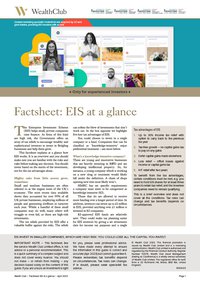Why consider EIS – plus three recent exits
Archived article
Archived article: please remember tax and investment rules and circumstances can change over time. This article reflects our views at the time of publication.
Experienced private investors have to date invested over £25 billion under the Enterprise Investment Scheme (EIS).
The government-backed scheme, introduced in 1994 and followed by its sister Seed Enterprise Investment Scheme (SEIS) in 2012, aims to encourage investors to support young, innovative companies with the potential for high growth – this type of business is key to generating jobs and powering the UK economy.
Investing in such businesses could offer private investors the potential for attractive returns. For instance, lead-generation software developer Cognism and content management platform ContentCal returned up to 43.2x and 7.7x their original investments respectively. Past performance is not a guide to the future.
However, as experienced investors know, small young companies are by nature more prone to failure than established larger businesses, so there is significant risk when investing in such companies: if an investment fails, you could lose some or all of your money.
To somewhat mitigate such risk, the government offers generous tax reliefs to those who invest in EIS.
What are the tax reliefs available for investing in EIS? Where can one invest? How have some EIS funds performed and what are some recently-achieved exits? Read on to find out more.
Important: The information on this website is for experienced investors. It is not advice nor a research or personal recommendation to invest. If you’re unsure, please seek advice. Investments are for the long term. When you invest in early-stage businesses you should expect some to fail. EIS investments are high risk and only for experienced investors. You could lose all your capital: you should not invest money you cannot afford to lose.
EIS tax reliefs – in a nutshell
- Up to 30% income tax relief – so, for instance, a £10,000 investment could save £3,000 income tax. To qualify, you must have sufficient income tax liability.
- Carry back – you can use a current year’s EIS investment to apply for relief on a previous year's income tax bill.
- Tax-free growth – there’s normally no CGT to pay on exit, if you claimed income tax relief and the company has remained EIS-qualifying.
- Capital gains deferral – if you invest the full amount of a taxable gain into an EIS-qualifying investment, you can defer tax on the gain for as long as the money stays invested and EIS conditions are not breached.
- Loss relief – if the investment doesn’t work out, you could offset any loss, less the income tax relief received, against your income tax bill. So, an additional-rate taxpayer could effectively reduce a total loss of £1 to as little as 38.5p.
- Inheritance tax relief – EIS shares should be IHT-free, if held for least two years and still held on death.
The minimum holding period to retain EIS tax relief is three years. You could tax-efficiently invest up to £1,000,000 per tax year, or £2,000,000 if including Knowledge Intensive (KI) EIS. Tax rules can change and benefits depend on circumstances. EIS tax benefits are only available if the company maintains its EIS status.
Free factsheet: EIS at a glance
For more information please see our simple factsheet, which gives an overview of EIS, how they work, the risks and benefits.
If you have any questions on the guide or another investment matter, please get in touch.
You can email us or call us on 0117 929 0511. We're open from 9am to 5.30pm Monday to Friday.
EIS investing – some key points
Investors may choose to invest directly into an EIS-qualifying single company or via an EIS fund where monies are deployed across a portfolio of typically 5-10 companies carefully chosen by the fund manager. To qualify for investment, private or AIM-quoted small companies must meet a strict set of conditions, mainly to do with the age and size of the business.
Companies that can be classified as ‘knowledge-intensive’ – young, innovative businesses heavily investing in R&D and developing intellectual property – enjoy preferential treatment. These are allowed to raise more funds than other EIS-qualifying companies, and investors have twice as much allowance for claiming tax reliefs – you can tax-efficiently invest up to £2,000,000 in Knowledge Intensive EIS, rather than £1,000,000 – see Tax Reliefs above.
Investing into a single EIS-qualifying company has the potential for greater returns – but carries greater risks, because of the lack of diversification.
Risks – important
Investing in small businesses is inherently more risky than investing in large businesses, since small firms are more likely to fail. Single company EIS investments involve investing in an early-stage, loss-making business, which is by nature high risk and prone to failure. The high investment risk is one of the reasons the government offers tax benefits on EIS. The reliefs can soften the blow if things don’t work out, but amplify any gains if the firm succeeds.
EIS investments can also be hard to sell and value. In most instances, to realise an EIS investment you will need to wait until an exit is achieved, which in some cases could take over 10 years.
Nobody likes losing money, but as you should have received 30% initial tax relief the value of the investment has to effectively decrease by 30% before you are out of pocket. Loss relief could also help offset any losses against income or capital gains tax. You should not invest money you cannot afford to lose. Each EIS investment opportunity should be considered based on its investment merits rather than for the tax benefits: experienced investors should form their own considered view.
Examples of recent EIS exits
 ContentCal
ContentCal
‘Content marketing’ helps companies reach and build relationships with their customers by sharing relevant and useful articles, podcasts, videos, emails and social media posts. However, managing the content across different platforms and channels can be challenging and time consuming.
Addressing this, ContentCal streamlines the process of content creation, planning, scheduling and posting across websites and social channels – freeing up marketing teams so they can focus on activities that add the most value.
The company was founded in 2016 and its clients now include the NHS, Specsavers, BMW, as well as many freelancers and agencies.
ContentCal was backed by two EIS funds: Guinness and Fuel Ventures. From February 2020, Fuel Ventures invested a total of £4.5 million into the business, and Guinness invested £2 million in March 2021. In December 2021, ContentCal was acquired by Adobe for $110 million in an all-cash transaction. The exit delivered realised returns of between 4.7x and 7.7x for Fuel Ventures investors, and returns of 4.27x for Guinness investors. Past performance is not a guide to the future.
See Fuel Ventures EIS Funds performance track record
See Guinness EIS Fund performance track record
The Fuel Ventures Scale-up EIS Fund is open for applications. The next deadline to apply is 30 September 2022. You should be able to claim income tax relief in a current tax year or carry back to the previous tax year.
The Guinness EIS aims to deploy investors’ capital within the tax year in which a given tranche closes. The next tranche close is 30 September 2022, so investors should be able to claim income tax relief in the 2022/23 tax year or carry back to the 2021/22 tax year (not guaranteed).
 Cognism
Cognism
Cognism is one of the UK’s fastest-growing technology companies. Founded in 2015, Cognism has developed software that uses machine learning to help sales and business development professionals identify valid prospects.
SFC Capital, manager of the Startup Funding Club SEIS and EIS funds, took part in the first funding round in 2017 through its SEIS fund and followed on in 2018 through its 2017/18 EIS Fund.
At the time of SFC’s first investment, Cognism had recurring revenues of £4,500. In 2021, the company announced annual recurring revenues had reached over $11 million, and it was listed for the third year in a row amongst the LinkedIn Top Startups.
In January 2022, Cognism announced it raised $87.5 million in a deal led by American investment group Viking Global Investors. The deal valued the business at more than $147.5 million. SFC took the opportunity to sell part of its stake. The SEIS investment generated realised returns of 43.2x, whilst the EIS generated an average of 5.9x realised returns. Both funds have retained a significant stake in the company. Past performance is not a guide to the future.
See Startup Funding Club SEIS performance track record
See Startup Funding Club Angel Fund EIS performance track record
The next Startup Funding Club SEIS tranche close is 26 August for targeted deployment in the 2022/23 tax year. Investors should be able to claim income tax relief this tax year or carry back to last tax year (2021/22) – not guaranteed.
Startup Funding Club Angel Fund EIS is currently open for subscription and aims to deploy investors' capital within 12 months – not guaranteed.
Please note, you will also need to become an “elective professional client” of Startup Funding Club before your investment is accepted for the SEIS or EIS funds.
 Current Health
Current Health
Founded in 2015, Current Health is an AI software platform that automatically detects warning signs of health deterioration, so patients can be attended to promptly – optimising patient outcomes and overall cost of care. Patients can be continuously monitored at home or in hospital using a wireless wearable armband. Clients in the UK and US include NHS Trusts, Mount Sinai and AstraZeneca.
From 2016 to 2021, Par Equity invested a total of £7.3 million in Current Health.
In October 2021, after a year of growing revenue over 3,000%, Current Health was acquired by NYSE-listed electronics retailer Best Buy Co. Inc. for $400 million to support its “health at home” strategy.
By that point, Par was the second largest investor – despite being a small Scottish investor compared to the larger US co-investors. The sale generated a 5.9x return and profits of £35.6 million – past performance is not a guide to the future.
See Par EIS Fund performance track record
The Par EIS Fund is open for applications and targets deployment into 7-8 companies (not guaranteed).
Note: MMC Ventures EIS Fund also invested in Current Health – the fund is currently closed, but you can register your interest to be notified when it next opens.
Wealth Club aims to make it easier for experienced investors to find information on – and apply for – investments. You should base your investment decision on the offer documents and ensure you have read and fully understand them before investing. The information on this webpage is a marketing communication. It is not advice or a personal or research recommendation to buy any of the investments mentioned, nor does it include any opinion as to the present or future value or price of these investments. It does not satisfy legal requirements promoting investment research independence and is thus not subject to prohibitions on dealing ahead of its dissemination.
See current EIS offers
Browse all EIS offers available through Wealth Club
Read more about See current EIS offers
